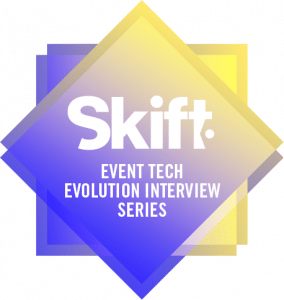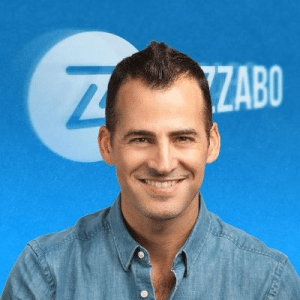Skift Take
Many event tech providers have created platforms in recent years to offer planners a set of tools with unified access to data. As the industry embraces analytics and artificial intelligence, providing useful insights that empower decision makers, platforms will likely take on bigger importance.
Event technology has helped revolutionize the process of planning a meeting along with the experience for attendees.
The space is crowded with competing products and platforms, however, adding an additional layer of complexity for planners.
In our new Event Tech Evolution Interview Series, we’re talking to leaders at the companies defining the future of the event technology space with an eye on the trends and disruptions to come. You can read all of the articles in the series here.
Complexity in the event tech space has increased in recent years.
At the same time, a variety of new platforms have sprung up to provide planners and buyers a range of services in one place. Why use one provider for your app, and another for your marketing efforts, when you can rely on a single suite of products to use when you want? Cvent pioneered this model, and others have followed suit.
Alon Alroy, co-founder and chief marketing officer of event software company Bizzabo, says anticipating the needs of meetings and event professionals was key to pivoting the company to a platform model at a crucial time. Bizzabo raised an additional $15 million in Series C funding last December and has introduced new tools for registration and event marketing alongside its original event app services.
Skift spoke to Alroy about the growing importance of data to event planners and the reasons why event tech needs to better anticipate the needs of organizations and stakeholders.
Skift: Bizzabo pivoted a few years ago from event apps to a wider platform for planning and setting up events. Why make that transition?
Alon Alroy: These are very exciting times in the event technology industry and it’s interesting to see how will things evolve.
Bizzabo was founded by me and my two co-founders, Eran and Boaz, around six years ago. And we started as an event networking app. We were one of the pioneers of the event app industry. And after several years, around three years that we’d been talking with thousands of event planners, we got to several insights that led to a decision to pivot to an all-in-one platform.
Those insights were that event apps are definitely a bigger piece of event engagement, but not at the core of the event organizers’ needs in terms of their overall event success. We constantly felt that it would have been nice to have, but not a must-have that really tackled all of their overall needs from technology. And in addition, the other insight was that most of the all-in-one platforms at the time, and I’m talking about 2015 … we got a very strong sentiment that the industry is being underserved because most of the existing solutions were based on legacy software by companies that were founded in the early 2000s.
We identified an opportunity to go for an all-in-one approach with a twist. And that twist is that we think the event technology world is going to move from an event management software to an event success platform. The product approach is a little bit different. It offers an all-in-one functionality but with an objective to help you run a very successful, rewarding, and impactful event. It’s not just about enablement of having online registration or having a website. It’s about having those different components with a very clear goal of marketing better, helping you fill out the room, helping you maximize engagement, and so on.
Skift: It must have been a tough process to make this transition, especially when you have industry leader Cvent as the 500-pound gorilla in the room.
Alroy: True. So, it’s true that Cvent is the big gorilla. And like in every market, Cvent is an easy choice. You can go to the big gorilla, obviously they make a lot of money, but it’s all about what’s kind of experience event marketers or planners want to offer their attendees. And there’s always a sacrifice.
In truth, [with] Cvent, a company that I have a lot of respect for, you’re compromising on the experience you provide to attendees and maybe on how your event’s perceived as a brand. And if you are choosing a platform that is more of the new generation, maybe you compromise on some features that are not yet developed, but your event is seen as way more innovative that can offer a more branded and a more personalized, cutting-edge technology to your attendees.
So at the end, you know, it’s the choice of the buyer obviously, but we try to be different than the big gorilla. We want to be the speedboat of the industry that is running very, very fast and people are just going to hop on board.
Skift: You’ve introduced various marketing, registration, and app-based features over the years. What types of technology do you think will make an impact going forward?
Alroy: We’re definitely paying attention to artificial intelligence and machine learning. I know everyone is probably talking about it and I know we as well have all kinds of ideas around what kind of value those new technologies can add to events. Unlike drones or virtual reality that now might be gadgets at events, I think artificial intelligence definitely has potential to make the attendee’s experience more efficient and the event organizer’s life more productive.
And the third one is to help marketers and event organizers in general really prove the power of events to the stakeholders. I think that, not for nothing, [events can be] the single largest marketing expense in the budget, but I don’t think it’s easy enough to prove [they are worth the cost]. And I think with technology and data, we’re gonna make it easier to really measure the impact of your event to take the feelings about, “OK, what type of event do I need to plan moving forward? A small event, a bigger event? Musical event?” from the external [reception], to then prove it with numbers and not just intuition.
Skift: I’m curious about the marketing piece of all this. There are so many digital marketers jockeying for the attention of potential attendees. How do you help your clients deal with that complexity?
Alroy: I think what you just said about digital becoming very clustered is very accurate. And the life of marketers are becoming more and more challenging. And it’s having a direct correlation, by the way, to events and that’s, in my mind, one of the reasons that the number of events is only increasing. It’s increasing because digital is becoming clustered and brands understand that the power of in-person is [more] impactful than ever. So in order to really get to your objective of whether we are around equipment or lead generation or customer retention, or even training up employees, there’s a trend to go back offline, I call it. A trend online to offline and this is of the need to create those hybrid experiences, if you take technology to measure the offline experiences is stronger than ever.
In terms of event marketing, I think email is still a very big piece of it, but … I think the days of sending those blasts of spray and pray will not be successful over time, so event marketers will need to become way more sophisticated in how they do email marketing. So there’s gonna need [to be] tools that show a lot of personalization and a lot of customization and a lot of reporting on what’s successful and what’s not, but I do think that email marketing is here to stay.
And another channel that I think is more effective than others in the digital space is retargeting, which is not adopted enough in the event marketing space.
Skift: Your team started with event apps, which have evolved quickly. What sort of innovation is happening with event apps right now? How are planners dealing with how complicated things have become?
Alroy: I see [the app experience] more as a platform these days. You have web, you have mobile, and attendees need to interact with your event and with each other on both platforms equally. And the app is just another medium that is easier to access when you’re on the go.
My advice to [planners] is to map their objective and make sure that they’re choosing an event app that helps them achieve that versus to go to the route of having everything, because it’s starting to be overwhelming and event app adoption rates are actually going down. People are a little bit overwhelmed with too much going on there, and we need to go back to the basics and tie the value [of an app] to the event success itself.
How is data going to inform decisions, and not only as an aftereffect? After the event is over, they check out the analytics. And I think the way we’re trying to lead the industry is to make data-informed decisions on an ongoing basis: before the event, between events, during the event. And I’ll leave it at that because we have a lot of offerings related to that [on the way] and I cannot share everything. But to make an event marketer someone who is data-driven all the time, not only when he or she are debriefing their event, [is the goal].
Have a confidential tip for Skift? Get in touch
Tags: bizzabo, event tech, event tech evolution, meetingsiq
Photo credit: The founders of Bizzabo. Alon Alroy, co-founder and chief marketing officer, says anticipating the needs of meetings and event professionals was key to pivoting the company to a platform model at a crucial time. Bizzabo


